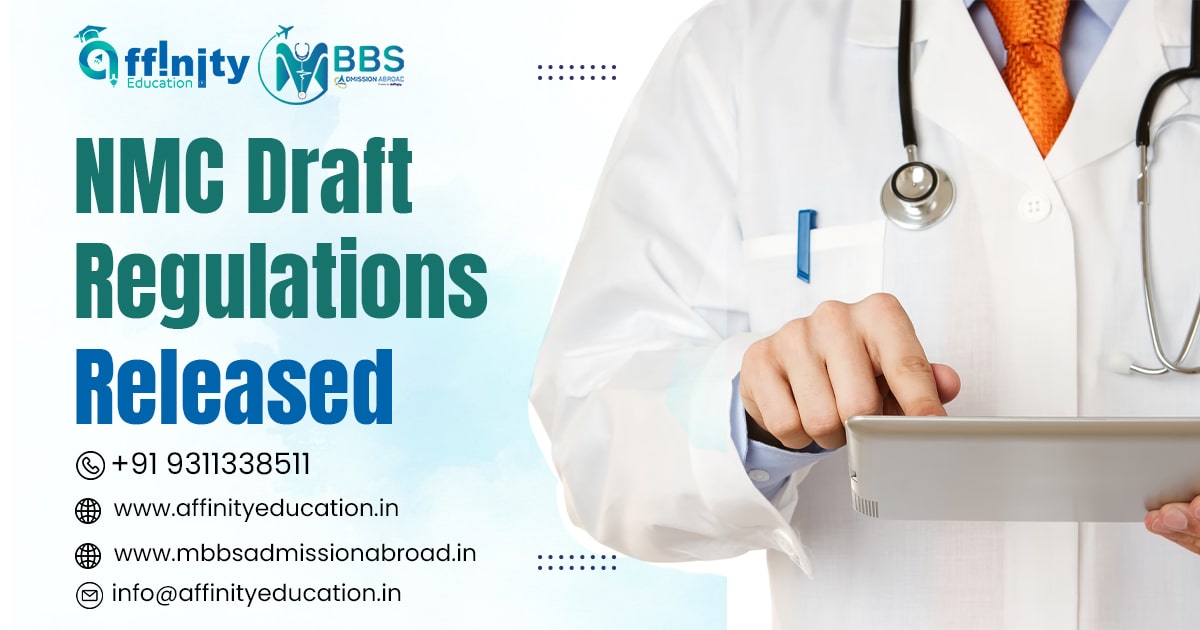New Draft Regulations Introduced by NMC; Comments Invited

The National Medical Commission (NMC) has recently come out with the Draft Regulations of License to Practice Medicine” which aims to bring a degree of uniformity to the entire registration process of medical practitioners in India. This change is being considered before the National Exit Test (NEXT Exam) rolls out and changes the entire registration process for medical practitioners.
The NEXT Exam will be a unified exam for both those who have completed their MBBS abroad as well as for those who’ve done so in India and those who seek broad-specialty medical courses.
According to said legislation, it’s the National Medical Commission (NMC) and Ethics and Medical Registration Board (EMRB) that will have the authority to accord a license to practice medicine in India
Here are some other guidelines that you need to remember regarding this legislation.
Duration of License to Practice Medicine
There are 3 main factors based on which the License’s validity depends -
- Validity remains until the licensed practitioner has requested to withdraw/discontinue for whatever reason(s)
- The issuing authority can cancel the license if it feels that the practitioner does NOT fulfill the eligibility criteria.
- Continuation of the validity period i.e. re-licensing depends on the regulations made for this purpose.
It’s important that all licensed medical practitioners constantly inform and update their latest and updated data in the “National Register” (additional qualifications, change in contact, address, etc.)
Eligibility Requirements for Medical License
For Indian Medical Graduates
- The graduation degree must be in MBBS (modern medical science and allopathy), which is duly recognized by the NMC’s “Graduate Medical Education Regulation (1997)” and “Regulations on Graduate Medical Education (Amendment), 2019” including subsequent amendments of NMC.
- Individuals must’ve completed the mandatory 1-year (12 month) rotating medical internship as mentioned in the above regulations.
- Individuals have passed the NEXT Exam (held under section 15 of the NMC Act, 2019) after it becomes operational
- Individuals must be registered under IMC Act (1956) before the NEXT becomes operational.
For Foreign Medical Graduates
- The graduation degree must be in MBBS (modern medical science and allopathy), which is duly recognized by the NMC’s “Graduate Medical Education Regulation (1997)” and “Regulations on Graduate Medical Education (Amendment), 2019” including subsequent amendments of NMC.
- The individual must be a recognized medical practitioner in his/her home country.
- She/he must be qualified for the NEXT Exam (which would be held under Section 15 of the NMC Act). This will be in accordance with Section 33(1) of the 2019 NMC Act.
- The individual must’ve completed the compulsory rotating medical internship/houseman ship before the NEXT Exam, in an NMC/MCI recognized college/hospital.
- Individuals must be registered under IMC Act (1956) before the NEXT becomes operational.
- Any other requirement other than the Screening Test Regulations (2002), Foreign Medical Institution Regulations (2002), etc.
Draft Legislation for Additional Qualifications
According to Section 33(3) of the NMC Act (2019), those who are already registered in the State and National Medical Register and have additional qualifications (if recognized under Sections 35 and 36), are allowed to update this information in the Register. These will be considered as part of their eligibility.
“Additional Qualifications” are those additional accolades that the individual has obtained and are separate from the “Primary Medical Qualifications”. These include PG degrees, certificates, diplomas, super-specialization, and doctoral degrees among other things.
The AQs that are recognized by Chapter VI of the NMC Act -
- Degrees, Diplomas, and other qualifications that are recognized by Chapter VI of the NMC Act 2019.
- Those “deemed-to-be recognized” under Chapter VI of the NMC Act 2019.
- Those offered by institutions of National Importance and other statutory bodies and recognized under Section 37(2) of the NMC Act 2019.
- PG degrees from the USA, Canada, Australia, New Zealand, and the UK are mentioned in Clause 4(4) of the Screening Test Regulations and recognized by the NMC.
- Medical qualifications included in Schedule II and Scheule III (Part II) of the Indian Medical Councils Act (1956).
Draft Regulations for Temporary Registration
Even to practice temporarily in India and register in India, practitioners need to obtain the necessary application and permission from the EMRB and NMC.
- This temporary period is subject to NMC regulations.
- The practitioner needs to submit a certificate by the concerned medical council/licensing board, not before a maximum of 6 months. Said authority also needs to guarantee the professional conduct of the candidate.
- The temporary license is prone to cancellation in case of professional misconduct by the practitioner.
The rules governing the above are subject to the national law that is in force in India at that time.
The duration of this temporary license shall only be limited either to the end of the course/program if the individual OR the last date of visa expiry of the practitioner.
Draft Regulations Regarding Sponsorship
In case of Sponsorship by Individual
- The sponsor needs to be a Registered Medical Practitioner (RMP) OR an appropriate authority of the institution where the foreign practitioner has taken the course, training, programs, etc
- Said registration needs to be valid at the time when the practitioner is applying and till the time the temporary registration is valid.
- The sponsor should NOT have been debarred from practice in the 1 year preceding the application of the practitioner.
- The sponsor himself/herself must possess the PG degree of the super-specialty course that the practitioner has applied for
In case of Sponsorship by a Medical Institution
- The sponsor needs to be the HOD or Head of the Institution.
- The institution must prove that it has adequate infrastructure, a number of faculty proportionate to the number of people being sponsored, and adequate medical and clinical resources at disposal.
- The institution must give details about the total number of PGs offered.
For more such updates, keep following us on https://www.mbbsadmissionabroad.in/news

